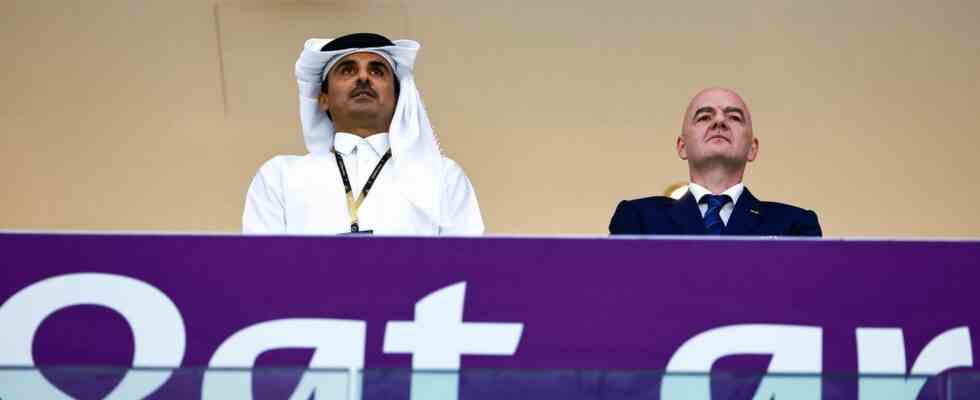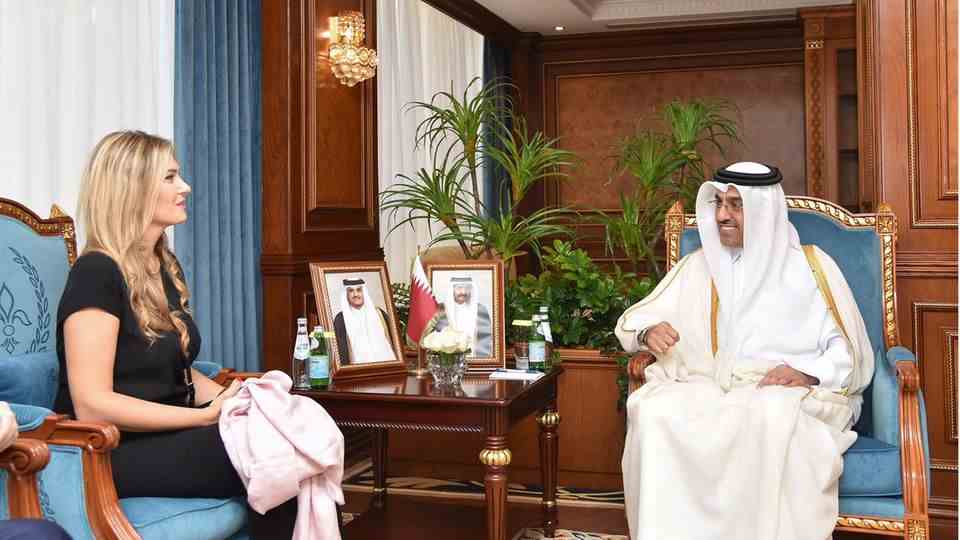Corruption allegations against EU parliamentarian
The Qatar method: aggressive state branding with money bag throwing
Qatar 2022: FIFA boss Infantino with Emir Tamim Bin Hamad Al Thani at the World Cup opening ceremony
© ATP images
Has Qatar bought influence in the EU Parliament with Eva Kaili and “sacks full of money”? The country denies the allegation. But the emirate has been aggressively lobbying on its own behalf for years.
Some take cover when Qatar throws bags of money around. Rod Stewart, for example, turned down an offer worth millions for a World Cup appearance, and musician Dua Lipa also had no desire. Legendary actor Morgan Freeman was different: he moderated the opening ceremony of the tournament. And David Beckham is making his face available to the Gulf State for ten years. Sold: allegedly 180 million euros. Against such sums, the money bags that are said to have been found with the Greek MEP Eva Kaili were lightweight: the Pasok politician from Qatar is said to have received around 600,000 euros. “Only”.
“Bags of Banknotes”
A number of details of the possible corruption scandal are still unknown. The Brussels public prosecutor’s office accuses the ex-parliamentary vice president and five other suspects of “membership in a criminal organization, money laundering and corruption”. The Emirate of Qatar is said to have tried to influence decisions in the European Parliament with considerable sums of money and gifts. There is talk of “sacks full of banknotes”. Eva Kaili herself rejects the allegations, and the first hearings will take place on Wednesday. But should the allegations prove true, it would be a catastrophe for Europe’s highest chamber of parliament – and another dimension in Qatar’s countless efforts to attract international attention.
Eva Kaili, the 44-year-old social democrat from Thessaloniki, repeatedly drew attention to her atypical positions within her group, said her colleagues in parliament after her arrest. On November 21, she gave a speech in Strasbourg, in which she praised the development of human rights in the World Cup host country and called Qatar a “pioneer in labor rights”. There was hardly any applause for her words, and “in the group of the Social Democrats and Socialists some colleagues were surprised about the contribution of the Greek”, writes the “Neue Zürcher Zeitung”.
A World Cup more unpopular than ever
There is hardly a word that is currently tickling people’s minds like the name of the tiny emirate on the Persian Gulf. However, it is rarely positive. Football purists, especially from Germany and England, reject the World Cup completely. Not only because there are indications that the tournament should be bought. Thousands of workers may have died during the construction of stadiums and other infrastructure. Added to this is the bad situation for women and homosexuals. And, to create atmosphere at the games, countless visitors are said to have been paid to cheer as “fans” in the stadiums. At the same time, the sale of alcohol has been severely restricted, which is not unusual for a Muslim country but doesn’t really seem to fit a football game.
At some point, the emotive word Qatar was so charged that even bad headlines were still good for PR purposes. Rewe, the supermarket chain, canceled its advertising deal with the DFB without further ado after the national team had refrained from wearing the One Love bandage. Although it was mentioned that the corresponding contract would have expired anyway, the company preferred to wallow in the glory of the upright fighter against oppression and for diversity. It is said that the Qataris would also follow such debates with interest, but the state has long been turning wheels of completely different dimensions. But they all have the same goal: visibility and influence.
Qatar’s influence on European football
The sovereign wealth fund Qatar Investment Authority (QIA) has assets of around 450 billion dollars, making the country one of the largest state investors in the world. Through the associated Qatar Holding, the country has a say in companies such as Volkswagen, Siemens, Deutsche Bank and the Hapag-Lloyd shipping company, is involved with airports such as Heathrow and, incidentally, the al Thani ruling family has bought into European football. Either directly as an owner like Paris Saint-Germain or indirectly via Qatar Airways as a sponsor of Bayern Munich, formerly also the big club FC Barcelona and AS Roma.
The writing on the chest of the Catalans sometimes had bizarre side effects. Photos with the distinctive red and blue jersey were partially censored in Saudi Arabia because Qatar Airways is considered a taboo company in the neighboring country. The Saudis’ relationship with Qatar is strained, to say the least. Between 2017 and 2021, the so-called Qatar crisis threatened to escalate into a real war. It is also the perceived threat from its overpowering neighbor that has made Qatar one of the most influential lobbyists on its own behalf.
Aggressive state branding
“For years, the country has engaged in aggressive state branding. The main tools of the highly armed PR machine: sporting events, the TV channel al Jazeera and Qatar Airways. All these brands serve the same purpose: visibility,” writes star-Reporter Jonas Breng in the summer about the unloved World Cup host. “Every small state that wants to have more weight in the world develops a strategy: Qatar has chosen sport as a niche in addition to its foreign policy role.” In addition to football, the country also offers other events: for example the World Championships in Athletics and tennis tournaments.
Controversial event
Criticism of the Qatar World Cup: This is how the world looks at the tournament in the emirate
However, alleged bribe payments to the EU parliamentarians are a different dimension than harmless, albeit extremely expensive, sporting events or the busy lobbying for which the Qataris in the US capital Washington are notorious. It is also unclear whether the money bags for Eva Kaili were intended for a specific purpose or “only” served to keep an important member of parliament warm. In any case, one reason could be the current debate in Brussels about visa facilitation for Qatari citizens.
Kaili votes without consultation
The responsible Green MP Erik Marquardt now told the DPA news agency that Kaili had recently sought a lot of contact with him. It was important to her that the decision was made quickly and that not so many conditions were placed on Qatar. She herself voted on the subject two weeks ago without consulting her parliamentary group, although she is not a member of the responsible committee. Now the position on visa liberalization is to be revised again. If Qatar actually “landscaped” in the matter, the Emirates, spoiled by success, are likely to have achieved the opposite.
Sources: DPA, AFP, Deutschlandfunk, BBC, sports1, Qatar-Information.de, capital“mirror“



